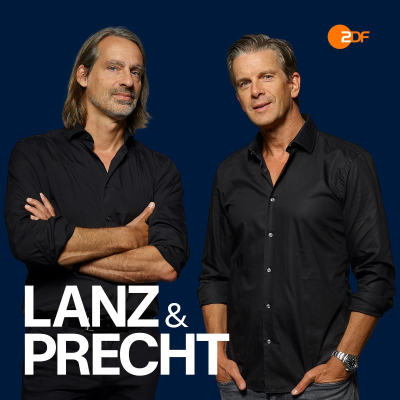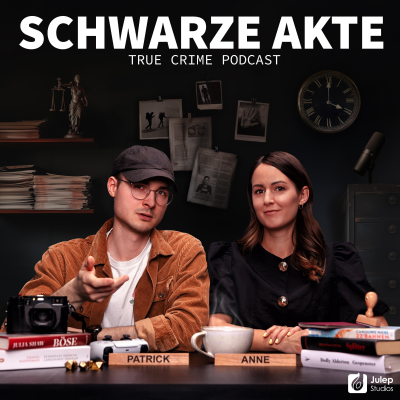
The Steve Pomeranz Show
Podcast von Steve Pomeranz
Nimm diesen Podcast mit

Mehr als 1 Million Hörer*innen
Du wirst Podimo lieben und damit bist du nicht allein
Mit 4,7 Sternen im App Store bewertet
Alle Folgen
155 FolgenWith http://terrystory.com/, a 31-year veteran with Keller Williams located in Boca Raton, FL For their final show together, Steve and https://teamterrystory.com/ interviewed each other, sharing some of their personal lives with listeners. They began the conversation by recounting a funny story about how they first met. After being introduced by a mutual friend, they discovered that they were actually working in the same building, just two floors apart. How Did Terry Get Into Real Estate? Terry told listeners that she first got into the real estate business 31 long years ago when she and her husband relocated to Boca Raton from Miami. Although she came from a real estate family, at the time she was working with Norwegian Cruise Lines in the travel industry,. Terry noted, ”I’m grateful not to be in the cruise line business right now.” Since she had gotten her real estate license while in college, her father encouraged her to give the business a try when she moved to Boca Raton. Terry said, “I jumped in with both feet, fell in love with it, and I did really well. I was ‘Rookie of the Year’ my first year.” That was an amazing feat, given the fact that she didn’t know a single person in Boca Raton when she started out. Terry mentioned one characteristic of her professional career that she and Steve share. She said, “Starting young really gives you an advantage because when you start in a real estate career, you have to have money in the bank in order to spend the money to do the proper marketing of yourself and get established.” Steve immediately replied that it was the same in his business as a financial advisor. He said, “In my business, too, it takes at least two years to build up enough of a clientele to even make a living, so starting young is definitely good.” From Coldwell Banker To Keller Williams Terry’s been mentioned so many times on the show as being with Keller Williams Realty that it may seem like she’s been there forever, but, in fact, she spent her first 29 years in the business at Coldwell Banker and only the last three with Keller Williams. When Steve asked her about the difference between the two firms, Terry explained her preference for Keller Williams. “The main difference is that it’s almost like an employee-employer relationship when you’re with a company like Coldwell Banker. When you’re with Keller Williams, it’s more of a partnership. We have profit sharing, which is a huge difference—50% of our office profit is shared among the agents.” Terry’s Personal Life Steve asked Terry to share some of her personal life. She related that she has two daughters, both in their early twenties. One daughter followed her into the real estate business where she is flourishing and her other daughter is a nurse. Both Terry and her husband are native Floridians—he from Fort Lauderdale and she from Miami. Like many Florida families, much of what they do for fun revolves around the water—boating, fishing, diving, sailing, water skiing. According to Terry, “Our weekend passion is taking the boat out.” Finally Learning Some Things About Steve When it was time for Terry to ask Steve some questions, the first thing she noted was that he’s never really talked about himself on the show. She asked him why that is. Steve explained, “Well, the show has really never been about me. It’s always been focused on the listener. It was never meant to be a vanity project or a vehicle to talk about myself. We have enough of that around us today already. I just really wanted to help people, to stick with the facts, and to get a chance to meet more people and learn more.” Steve’s natural curiosity has been a driving force behind the show, as he’s always had a thirst for knowledge. He shared with Terry: “I love to learn about the world. I travel a lot, and I love to read.
With Terry Story, a 31-year veteran with Keller Williams located in Boca Raton, FL For their final show together, Steve and Terry Story interviewed each other, sharing some of their personal lives with listeners. They began the conversation by recounting a funny story about how they first met. After being introduced by a mutual friend, […] The post Steve Turns The Tables As Terry Interviews Him!!! [https://stevepomeranz.com/radio/real-estate/steve-turns-the-tables-as-terry-interviews-him/] appeared first on Steve Pomeranz [https://stevepomeranz.com].
With Christine Benz, Personal Finance Editor at http://morningstar.com/ and author of The Morningstar Guide to Mutual Funds: Five Star Strategies for Success Steve spoke with https://www.morningstar.com/authors/30/christine-benz, Personal Finance Editor at Morningstar and the author of “https://www.amazon.com/Morningstars-30-Minute-Money-Solutions-Step/dp/0470918136” and the “https://www.amazon.com/Morningstar-Guide-Mutual-Funds-Strategies/dp/0470137533”, to get some insights for retirees on how to handle the current low-yield environment. The Bucket Strategy Steve started off their conversation by asking Christine straight out how, in such a low-yield environment, people expecting to live off their yield income can manage to get by. He laid out the current situation on yields, saying, “The 10-year Treasury is around 0.6., 0.7%. Short-term CDs are in the 1% range, maybe 2%. So, that probably means, after taxes, losing money to inflation.” Christine replied that “It’s been an ongoing challenge over the past several decades where we’ve had yields on safe investments go lower and lower and lower. That’s left income-oriented retirees with the option of either subsisting on less or gravitating to higher risk, higher income-producing securities. I think that there are other ways to think about building cash flow in retirement that don’t involve exclusively income distribution.” Steve then asked her to explain what she calls “the bucket strategy.” Christine credits Coral Gables financial planner Harold Evensky as a strong influence in developing the strategy which she explained to listeners: “The basic idea is that you’re kind of structuring your portfolio as a series of buckets. In bucket one, you’ve got cash—CDs, money market accounts, what you have in your checking account, etc. The idea is to have in there two years’ worth of expected withdrawals that you can subsist on when your portfolio isn’t kicking off enough income to meet your living expenses.” She went on to explain bucket two: “Once you’ve developed bucket one, then you’re kind of stepping out on the risk spectrum. With bucket two, you’ve got a portfolio of high quality short and intermediate-term bonds. You’re taking more risks, but you’re potentially picking up a little higher income. The goal is to build yourself a runway with buckets one and two of roughly 10 years’ worth of portfolio withdrawals in safe investments.” To combat the current extremely low-yield situation, Christine further suggested, “I think you can potentially add some corporate bonds into the mix to potentially pick up a slightly higher yield. You might also think about adding some dividend producing equities.” Seek Professional Advice Steve remarked about how much the yield environment has changed over the years. “When I started in the business in 1981, the yields on fixed income were considerably higher than the dividend yields on stocks. But in recent history, that has turned around 180 degrees. We now see a higher yield on the average stock, let’s say 2%+, than we do on US Treasuries and on some corporate bonds as well.” He asked Christine if people can manage to keep up with inflation with a 10-year runway composed mostly of bonds paying less than 2%. Her advice was to get professional advice, explaining that each individual’s personal financial situation and needs are different. “It’s very personal – run the numbers and see how your retirement portfolio sustainability looks. It may be that 10 years’ worth of cash flows in very...
Well, folks, this is our final show, and I want to wrap up my long tenure by sharing some of the most important lessons I have learned over these many years. First, however, I want to thank everyone currently involved in its production. First, there is Brian Zeikowitz, my engineer. Brian has been with me since 2008 and, poor guy, he’s been listening to every word of the show, every week, to make sure I sound much smarter than I am. As a matter of fact, when we were discussing the show’s end, he reminded me of a story I told which made an impression on him, and it’s one that I had totally forgotten. So I would like to share it with you. Back in 1987, I had been a stockbroker for six years, working at Merrill Lynch at the time and was still struggling to get on my feet and build a clientele. Of course, you may remember that 1987 turned out to be a very challenging year because of the 25% market crash on October 22nd. This crash was totally unexpected and reminded everyone of the 1929 Stock Market Crash which ushered in the Great Depression. So everyone was scared and shaken. Unfortunately, I was a casualty of bad timing because on October 1st, I had closed on a new, bigger home and my costs had risen dramatically. That year and the few that followed created a tsunami of events for me, a combination of high expenses combined with lower income similar to what is going on with a lot of folks today due to the Covid-19 crisis. In order to keep everything going, I used my credit cards and any other debt I could muster to stay afloat. And I was not alone. A lot of my fellow brokers in the business were in trouble too and some of them decided to file for bankruptcy the following year. I was tempted. It was easy to do, and I noticed that those who did were still able to get a loan to buy cars and other things and it didn’t seem like it had much in the way of serious consequences. So, I thought hard about it and finally decided not to do it, though it would have relieved me of much pressure and anxiety. My reasons? First and foremost, I felt I owed this money and it should be paid back. Now I know it’s not possible for everyone to adopt this attitude, but I was still earning a living and slowly building a clientele, and I had hope that this difficult time would eventually improve. I hoped it wouldn’t turn out to be a race to the finish however, so it was pretty nerve-wracking. Also, I didn’t really know what the true future effects of a bankruptcy would be. There’s a lot of unforeseen consequences that can happen when you make big decisions like that. So, here’s my point to the story. Eight years later, in 1996, after being so unhappy with the sales culture of the brokerage business, I desperately want to change the way I did business. Fortunately, an opportunity arose which allowed me to start my own fee-only financial planning and advisory business and create my own culture. However, there was one caveat and guess what that was? In order to head up a firm as an investment advisor, I would not have been allowed had I declared bankruptcy. Wow, I thought, I really missed that bullet! All that followed, a business that I loved, my great clients, and this radio show, would not have happened had I taken the other course of action. So, the bottom line is: You never know what the consequences would have been for me had I taken the easier way out. Okay, before I get into today’s commentary, I want to thank a few people who have been a tremendous help to me. First, my producer, Erica Stimolo. We are a small operation here, and Erica is the chief cook and bottle washer, and I have relied on her common sense to help guide me week after week. Happily, Erica has accepted a new position with my former investment firm and all will be okay. My editor, Carol Malzone, who is also my partner in life, has transported our website and weekly update into the literary light.
On this final show, I talk about some of the most important themes I have covered over these many years. Themes that may help you become a little wealthier and a little more financially secure. The post My Last Commentary To You All [https://stevepomeranz.com/radio/steves-commentary/my-last-commentary-to-you-all/] appeared first on Steve Pomeranz [https://stevepomeranz.com].























